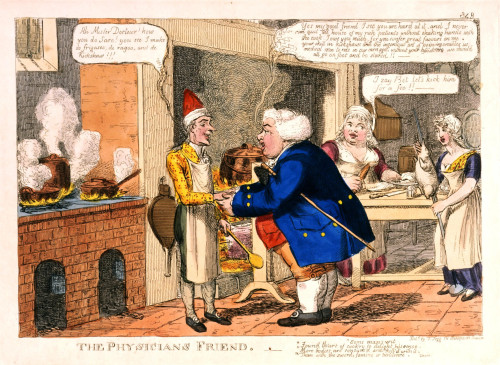17/2000
Collection
Paintings, Prints and Drawings
Brief description
‘The Physicians Friend’, hand-coloured etching of a chef and a doctor in a kitchen by Charles Williams, published by T. Tegg in October 1815.
Title
The Physicians Friend
Object name
etching
etching
etching
Object number
17/2000
Production person
Charles Williams (artist)
Production organisation
T.Tegg (publisher)
Production date
1815 (published)
Production place
London (printed)
Period
Georgian (1714-1837)
Material
paper
Technique
etched
hand coloured
hand coloured
Physical description
Hand-coloured etching, with publication line, title and a verse printed below the image. The print has a visible plate mark and is mounted.
Content description
The etching shows the interior of a kitchen of a large house with an open fireplace with a range and two further ovens and hobs on the left. There is a large plain wooden table for preparing food, a set of bellows next to the ovens and plates hanging on the back wall. The floor is laid with large red tiles. Two women are cooking and a chef is shown greeting a doctor who is wearing a blue coat with gold buttons.
The doctor, wearing a blue coat and with a gold topped cane under his arm, leans forward with his arms outstretched towards a French chef, wearing a red cap and carrying a large wooden spoon in one hand. The chef is shown saying 'Ah Mister Docteur! how you do Sare! you see I make de figasse de ragoo, and de Kickshaw!!!', while the Doctor replies 'Yes my good friend I see you are hard at it, and I never can quit the house of my rich patients without shaking hands with the cook. I owe you much, for you confer great favours on me your skill in kickshaws and the ingenious art of poisioning enables us medical men to ride in our carriages, without your assistance we should all go on foot and be slared!!-'
In the background a woman with a rolling pin comments to another woman who is shown spitting a suckling pig, 'I say Bet let's kick him for a fee!!-'. In the background, an enormous cauldron bubbles on the fire and pots and pans are shown on a large range.
The doctor, wearing a blue coat and with a gold topped cane under his arm, leans forward with his arms outstretched towards a French chef, wearing a red cap and carrying a large wooden spoon in one hand. The chef is shown saying 'Ah Mister Docteur! how you do Sare! you see I make de figasse de ragoo, and de Kickshaw!!!', while the Doctor replies 'Yes my good friend I see you are hard at it, and I never can quit the house of my rich patients without shaking hands with the cook. I owe you much, for you confer great favours on me your skill in kickshaws and the ingenious art of poisioning enables us medical men to ride in our carriages, without your assistance we should all go on foot and be slared!!-'
In the background a woman with a rolling pin comments to another woman who is shown spitting a suckling pig, 'I say Bet let's kick him for a fee!!-'. In the background, an enormous cauldron bubbles on the fire and pots and pans are shown on a large range.
Content object
stove
table
table
Dimensions
Length: 35cm
Width: 25.5cm
Length: 50cm
Width: 40cm
Width: 25.5cm
Length: 50cm
Width: 40cm
Website keywords
images of kitchens
stoves and ranges
stoves and ranges
Label
Label text for the exhibition At Home with the World, Geffrye Museum (20 March 2012- 9 September 2012):
The Physician’s Friend
Hand-coloured etching
By Charles Williams, published by T. Tegg, London, England, October 1815
Eighteenth-century England had an uneasy relationship with France. To have a French chef was a sign of a cultivated palate, and could only be afforded by the rich, but the imported cooks were also seen as unhealthy manipulators of sound English food. In 1747 the bestselling cookery author Hannah Glasse was particularly incensed by the fashionable favour they enjoyed: ‘So much is the blind Folly of this Age…that [people] would rather be impos’d on by a French Booby, than give Encouragement to a good English cook!’
The Physician’s Friend
Hand-coloured etching
By Charles Williams, published by T. Tegg, London, England, October 1815
Eighteenth-century England had an uneasy relationship with France. To have a French chef was a sign of a cultivated palate, and could only be afforded by the rich, but the imported cooks were also seen as unhealthy manipulators of sound English food. In 1747 the bestselling cookery author Hannah Glasse was particularly incensed by the fashionable favour they enjoyed: ‘So much is the blind Folly of this Age…that [people] would rather be impos’d on by a French Booby, than give Encouragement to a good English cook!’

